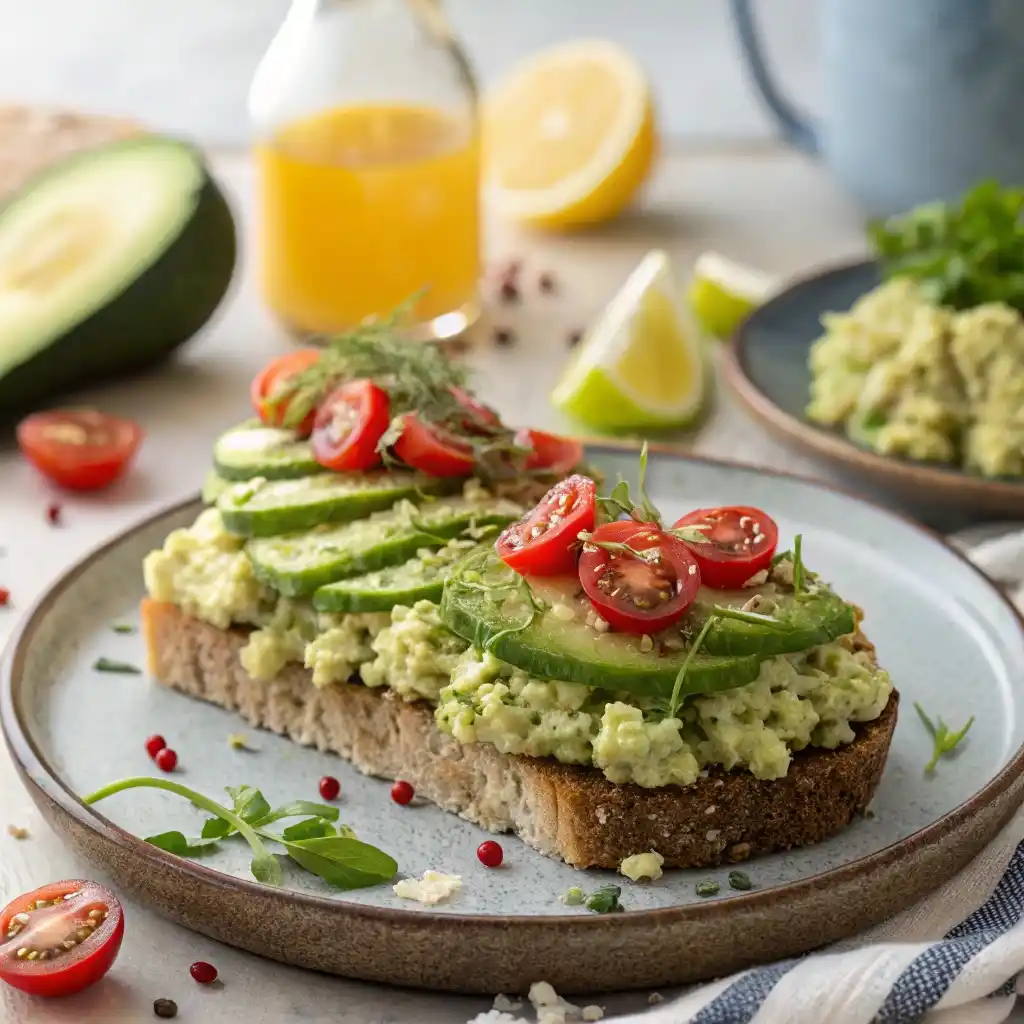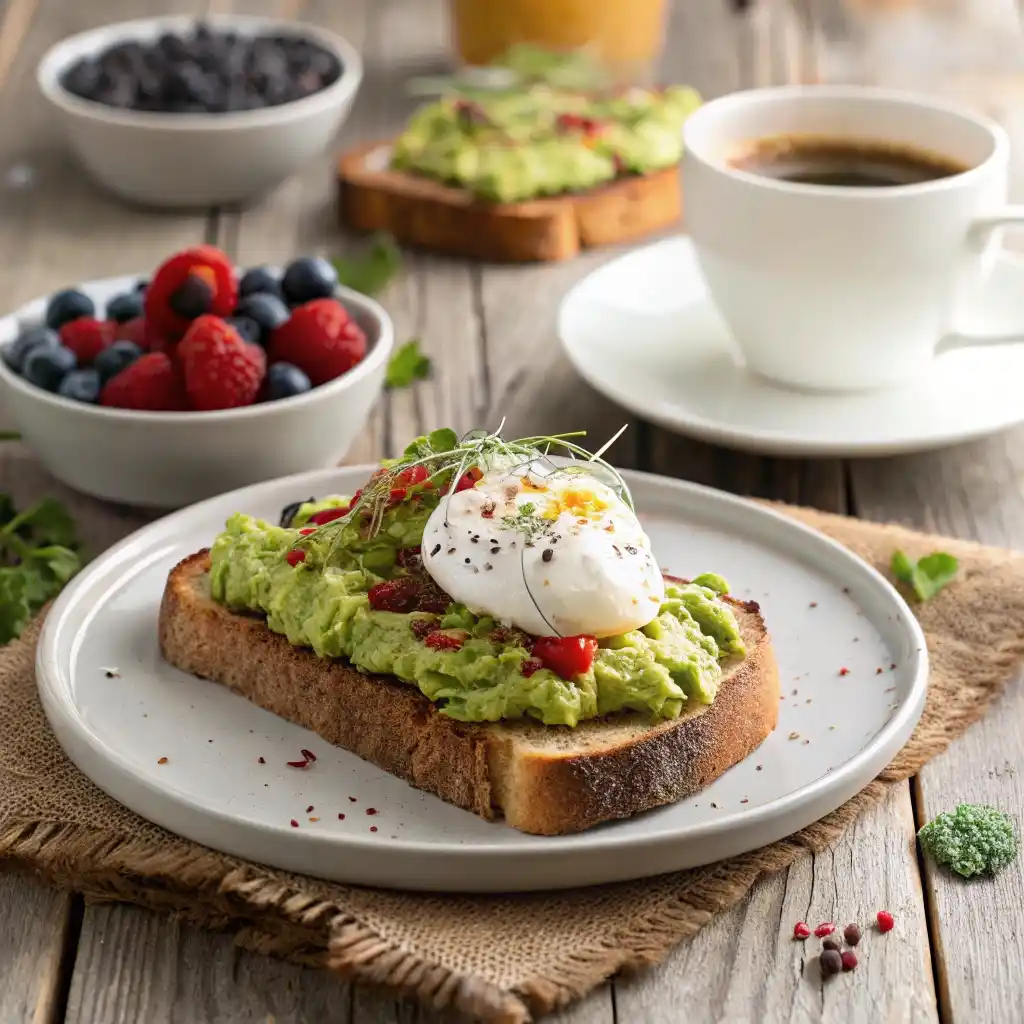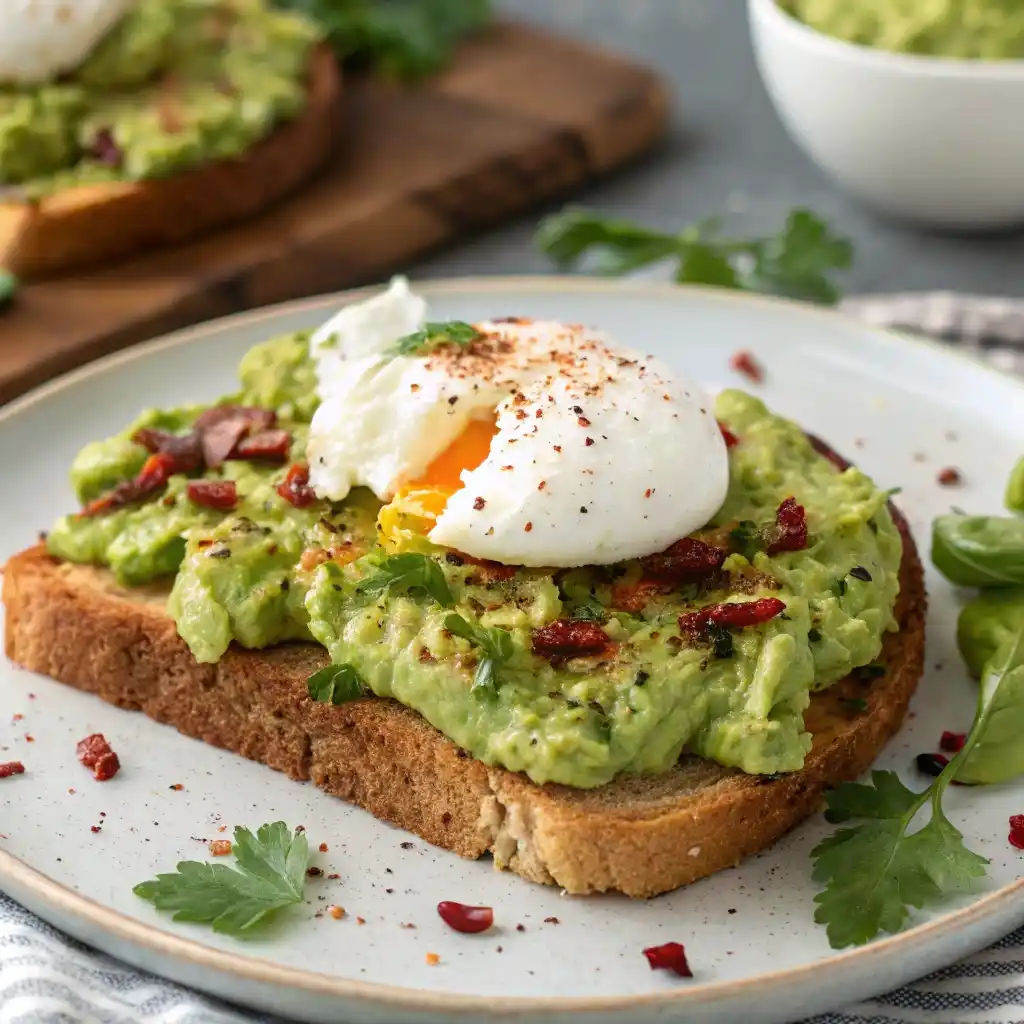Avocado toast have become synonymous with health-conscious eating, earning their place on brunch menus and social media feeds alike. Known for their creamy texture, vibrant color, and versatility, avocado toasts are not just a trendy meal but also a nutrient-packed option for breakfast, lunch, or snacks. This article explores the nutritional value of avocado toasts, highlighting their health benefits and offering tips to maximize their potential as a balanced meal.

Nutritional Profile of Avocados
Avocados are the centerpiece of this dish, celebrated for their exceptional nutritional value:
- Healthy Fats: Avocados are rich in monounsaturated fats, which support heart health by reducing bad cholesterol and promoting good cholesterol.
- Vitamins and Minerals: They contain potassium, which helps regulate blood pressure, as well as vitamins E, K, and C, which boost immunity and skin health.
- Antioxidants: Lutein and zeaxanthin in avocados support eye health and protect against oxidative stress.
- Fiber: With around 7 grams of fiber per 100 grams, avocados contribute to digestive health and prolonged satiety.
Nutritional Benefits of Whole-Grain Bread
Pairing avocados with quality bread enhances the nutritional profile of the meal:
- Fiber: Whole-grain bread is an excellent source of dietary fiber, supporting digestion and maintaining stable blood sugar levels.
- Complex Carbohydrates: These provide sustained energy, making avocado toast an ideal choice for starting the day or refueling during a busy afternoon.
- Nutrients: Whole grains are rich in B vitamins, iron, magnesium, and selenium, which are essential for energy production and overall health.
The Dish as a Balanced Meal
Avocado toast is more than just a trendy dish; it’s a balanced meal that combines essential macronutrients for optimal nutrition:
- Healthy Fats: The monounsaturated fats in avocados support heart health, reduce bad cholesterol levels, and promote satiety, making it easier to control portions.
- Complex Carbohydrates: Whole-grain bread adds fiber and complex carbs, providing a steady release of energy and improving digestion.
- Optional Protein: Adding toppings like eggs, smoked salmon, tofu, or seeds turns avocado toast into a protein-rich meal, supporting muscle repair and prolonged fullness.
This combination of healthy fats, carbs, and protein makes avocado toast a complete, nutrient-dense option that’s perfect for breakfast, lunch, or even a light dinner.
Health Benefits of the Meal
Avocado toast offers numerous health benefits when prepared with wholesome ingredients:
- Heart Health: The monounsaturated fats in avocados and the fiber in whole-grain bread help reduce bad cholesterol and support cardiovascular health.
- Digestion: Fiber from both avocados and whole-grain bread promotes regular bowel movements and a healthy gut.
- Energy Boost: The carbohydrates in the bread provide a steady supply of energy, while the fats in avocados keep you feeling fueled for longer periods.
- Weight Management: The meal is filling and nutrient-dense, making it a satisfying option that can help prevent overeating when portion sizes are managed appropriately.
This dish’s versatility and healthful ingredients make it a valuable addition to a balanced diet.
Potential Downsides of the Iconic Toast
While avocado toast is healthy, there are potential downsides to consider:
- Overeating: Avocados are calorie-dense, with around 240 calories per medium avocado. Overloading your toast can lead to excessive calorie intake, which may hinder weight management goals.
- Calorie Considerations: Pairing avocado toast with high-calorie toppings like cheese or sugary spreads can quickly add up. Opt for nutrient-dense, low-calorie toppings instead.
- Nutrient Imbalances: Relying solely on avocado toast without incorporating other food groups may result in a lack of variety in your diet. To create a balanced meal, include protein-rich or vitamin-packed toppings like eggs, tomatoes, or spinach.
How to Make the recipe Healthier
Avocado toast is already a nutritious choice, but there are ways to boost its health benefits even further:
- Choose Whole-Grain Bread: Opt for bread rich in fiber and nutrients, such as sprouted grains or 100% whole grain, to improve digestion and provide sustained energy.
- Incorporate Protein: Add protein-rich toppings like eggs, smoked salmon, cottage cheese, or tofu to make the meal more filling and balanced.
- Include Vegetables: Add sliced tomatoes, cucumbers, or leafy greens to increase vitamins and antioxidants.
- Sprinkle Seeds and Nuts: Chia seeds, flaxseeds, or crushed nuts add omega-3s, healthy fats, and a satisfying crunch.
- Use Healthy Oils: Drizzle olive oil or avocado oil for added flavor and heart-healthy fats.
With these simple swaps and additions, you can transform your avocado toast into a powerhouse meal.
Best Toppings for Avocado Toast
Toppings can elevate avocado toast by adding flavor, texture, and nutrition. Here are some options:
- Protein Options:
- Poached or fried eggs for a creamy, rich topping.
- Grilled chicken, turkey slices, or plant-based protein like tempeh for added satiety.
- Smoked salmon for healthy omega-3 fats and a savory twist.
- Vegetables:
- Sliced radishes, cucumbers, or cherry tomatoes for freshness and crunch.
- Roasted red peppers or caramelized onions for bold flavors.
- Leafy greens like spinach or arugula for added nutrients.
- Fruits:
- Sliced strawberries or figs for a sweet touch.
- Pomegranate seeds for a burst of tangy flavor and antioxidants.
- Superfoods:
- Chia seeds, flaxseeds, or hemp hearts for omega-3s and fiber.
- Crumbled feta or goat cheese for protein and a tangy flavor boost.
- Spices like turmeric or smoked paprika for an extra kick.
Mix and match these toppings to create endless variations of the recipe tailored to your preferences.
Avocado Toast for Special Diets
The Recipe can be easily adapted to meet various dietary needs:
- Keto: Replace traditional bread with low-carb alternatives like cloud bread or cauliflower crust. Add keto-friendly toppings like bacon, cheese, or eggs.
- Vegan: Use plant-based bread and top with vegetables, hummus, or nutritional yeast for a savory, cheesy flavor.
- Gluten-Free: Choose certified gluten-free bread made from rice, quinoa, or almond flour.
- Low-Sodium: Skip added salt and use natural flavor enhancers like lemon juice, herbs, or garlic powder.
Are Avocado Toasts Sustainable?
Avocado toast is celebrated for its health benefits, but its environmental impact raises important questions about sustainability:
- Environmental Impact of Avocado Farming:
- Water Usage: Avocados require a significant amount of water to grow, with an average avocado consuming about 70 gallons of water. This intensive water use can strain local resources, especially in regions prone to drought.
- Carbon Footprint: Avocados are often exported from countries like Mexico and Peru to meet global demand. The transportation and refrigeration contribute to carbon emissions.
- Ethical and Eco-Friendly Practices:
- Support Sustainable Farming: Look for avocados certified by organizations like Fair Trade or Rainforest Alliance, which ensure responsible farming practices and fair labor conditions.
- Buy Locally: Choose locally grown avocados when available to reduce transportation emissions.
- Minimize Food Waste: Use the entire avocado in recipes or store leftovers properly to avoid wastage.
Balancing avocado toast’s health benefits with sustainable choices can help reduce its environmental footprint.
Common Myths About Healthy Avocado Toast

Despite its popularity, avocado toast is surrounded by several misconceptions:
- Myth 1: Avocado Toast Is Overrated
- Fact: While trendy, avocado toast is genuinely nutritious, providing healthy fats, fiber, and vitamins. Its simplicity and versatility make it a practical meal option.
- Myth 2: Avocado Toast Is Unhealthy
- Fact: Avocado toast can be a wholesome choice when paired with whole-grain bread and nutrient-dense toppings. Moderation is key to managing calorie intake.
- Myth 3: Avocado Toast Is Expensive
- Fact: While cafe versions can be pricey, making avocado toast at home is cost-effective. A single avocado can make 2–3 servings, significantly lowering the cost.
Understanding these myths helps appreciate the balance of nutrition, accessibility, and enjoyment that avocado toast offers.
Cultural Variations of Avocado Toast
Avocado toast is a global phenomenon, with unique regional twists reflecting local flavors:
- Mexico: Incorporates traditional ingredients like salsa, cotija cheese, and lime juice on tortillas or crusty bread.
- Australia: A brunch staple featuring avocado with feta cheese, chili flakes, and poached eggs on sourdough.
- Japan: Includes toppings like soy sauce, sesame seeds, and nori for an umami-packed take.
- Middle East: Uses za’atar seasoning, olive oil, and pomegranate seeds for a bold and aromatic flavor.
- Scandinavia: Combines avocado with smoked salmon, pickled vegetables, and rye bread for a fresh, hearty meal.
These variations showcase avocado toast’s adaptability and cultural relevance, making it a truly global dish.
FAQs About Avocado Toasts
- Is avocado toast healthy?
Yes! Avocado toast is rich in healthy fats, fiber, and essential nutrients like potassium and vitamins E and K. It’s a balanced meal, especially when paired with whole-grain bread and nutritious toppings. - How can I make avocado toast at home?
Mash a ripe avocado with a pinch of salt and a squeeze of lemon or lime juice. Spread it on toasted bread, then add toppings like eggs, tomatoes, or seeds to customize it to your taste. - Can the dish be stored for later?
While best enjoyed fresh, you can store mashed avocado in an airtight container with a bit of lemon juice to prevent browning. Assemble the toast right before eating to avoid soggy bread. - What type of bread is best for the Meal?
Whole-grain, sourdough, or rye bread are ideal options for their nutritional benefits and ability to hold up well under toppings. - Are there low-calorie versions of the Meal?
Yes! Use thin slices of whole-grain bread and control portion sizes for toppings. Avoid high-calorie add-ons like cheese or heavy sauces.
Where to Find the Best Avocado Toast
For those looking to enjoy expertly crafted avocado toast, here are the best places to check out:
- Cafes and Brunch Spots: Trendy cafes often serve avocado toast with creative twists, such as poached eggs, smoked salmon, or microgreens. Look for local favorites in your area.
- Specialty Bakeries: Artisan bakeries often use fresh, high-quality bread as the base for unique avocado toast creations.
- Restaurants with Seasonal Menus: Farm-to-table restaurants frequently feature avocado toast with seasonal ingredients, offering a fresh and flavorful experience.
- Online Reviews: Use apps like Yelp or TripAdvisor to discover highly-rated avocado toast options nearby.
Conclusion
Avocado toast has earned its place as a beloved dish for its nutritional benefits, versatility, and ease of preparation. When made mindfully with whole-grain bread and balanced toppings, it provides a satisfying, healthful meal that supports heart health, digestion, and energy levels.
Whether you’re crafting it at home or enjoying it at a local cafe, avocado toast remains a timeless choice that blends simplicity with creativity. By experimenting with toppings and customizing it to your dietary preferences, you can keep this trendy meal both exciting and nourishing.
You May also be Interested in:
Why Is Avocado Toast So Trendy? The Origins and Appeal of This Iconic Dish

